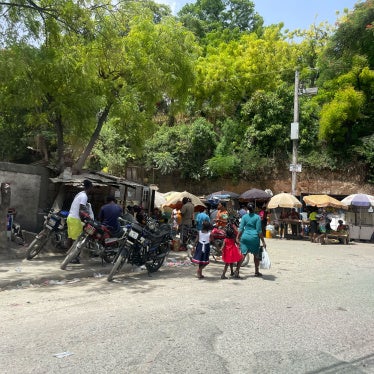Nicaragua’s new blanket ban on abortion – even in cases of rape, incest or life-threatening pregnancy – violates international human rights standards and poses a grave risk to women, Human Rights Watch said today in an open letter to the country’s Supreme Court.
The court is expected to rule on the constitutionality of the ban, imposed last November, within the next two weeks.
“International law prohibits bans on abortion because such restrictions deny women their basic rights to life and health,” said José Miguel Vivanco, Americas director at Human Rights Watch. “Nicaragua’s abortion ban is an affront to international standards – and Nicaragua’s women.”
The criminalization of abortion in Nicaragua is inconsistent with Nicaragua’s obligations under international law because it threatens women’s and girls’ rights to life, health, equality, privacy, physical integrity, and freedom of religion and conscience. Human Rights Watch’s open letter to Nicaragua’s Supreme Court includes a full analysis of these principles.
Nicaragua’s National Assembly enacted the comprehensive ban on abortion during the country’s hotly contested 2006 presidential campaign. It eliminated the possibility for women and girls to seek abortion for therapeutic purposes – that is, to protect their health or life – even though these provisions in the criminal code had existed in Nicaragua for more than 100 years. The current abortion ban places Nicaraguan women’s lives at risk and threatens them and healthcare professionals with criminal prosecution and up to 14 years of prison.
The ban’s harmful impact on women is already evident. During a research mission to Nicaragua in August, Human Rights Watch documented delays in the provision of obstetric emergency care in the public health sector that resulted in avoidable fatalities. Pregnant women with health problems, particularly poor women who depend on the public health sector for services, frequently showed a pronounced fear of seeking treatment. Both doctors and women attributed the delays in treatment and seeking treatment to the ban because of apprehension about violating the law. The ban makes women and girls with no economic resources especially vulnerable to unsafe abortion practices.
“Families have lost their daughters, sisters and wives due to delayed treatment of post-abortion hemorrhages and other complications,” said Vivanco. “All the doctors we interviewed said the ban has created a climate of fear in the public health sector, and this has led to fatal delays in emergency obstetric care.”
Nicaraguan government officials acknowledged to Human Rights Watch that the ban has had an adverse effect on access to potentially life-saving treatment. They also said that the health ministry had received more complaints about delays in treatment after the ban was imposed.
Human Rights Watch spoke with a sampling of government officials, including from the health ministry, who expressed deep concern with the ban’s health impact on women, but said that Nicaragua’s major political parties endorsed the ban to gain the political support of the Roman Catholic Church and the Evangelical Church during the 2006 presidential elections.
The Sandinista party, currently in power, controls 40 percent of the seats in the National Assembly, and is widely thought to hold the key to a legislative reconsideration of the blanket ban.
“Even in the health ministry, doctors recognize that this ban is a threat to women’s health and lives,” said Vivanco. “Nicaraguan officials should put women’s lives ahead of political rhetoric and end this harmful ban.”
Selected testimony:
“She was bleeding … That’s why I took her to the emergency room … but the doctors said that she didn’t have anything. … Then she felt worse [with fever and hemorrhaging] and on Tuesday they admitted her. They put her on an IV and her blood pressure was low. … She said: ‘Mami, they are not treating me.’ … They didn’t treat her at all, nothing. … When her husband came to bring her food, he heard screams. … They took her to [another hospital in Managua], but it was too late. She died of cardiac arrest. … She was all purple, unrecognizable. It was like it wasn’t my daughter.”
-- Angela Morales [real name withheld], mother of a 22-year-old woman who died from pregnancy-related hemorrhaging at public hospital in Managua in November 2006, only days after the blanket ban on abortion was implemented. From comments made by the doctors at the time, Morales believes her daughter was left untreated because doctors were reluctant to treat a pregnancy-related emergency for fear that they might be accused of providing therapeutic abortions.
“Here [at this hospital] we have had women who have died. … For example, [name withheld] came here and had an ultrasound. It was clear that she needed a therapeutic abortion. No one wanted to carry out the abortion because the fetus was still alive. The woman was here two days without treatment till she expulsed the fetus on her own. And by then she was already in septic shock and died five days later. That was in March 2007.”
-- Dr. Francisco Del Palacio, Deputy Educational Director at Aleman Hospital, Managua.
“The effect [of the ban] has been in the medical personnel. … There have been situations that should have been treated [but] out of fear they haven’t been treated fast. … For example, in one hospital we have a patient with an ectopic pregnancy, it was ruptured, there was nothing to do [to save the fetus] but [the patient] was not treated. … It’s like an excuse. … The doctors don’t want to put themselves on the line. … We have received complaints.”
-- Dr. Jorge Orochena, Director for Quality Control, Health Ministry.
To view the open letter from Human Rights Watch to the Nicaraguan Supreme Court, please see:








